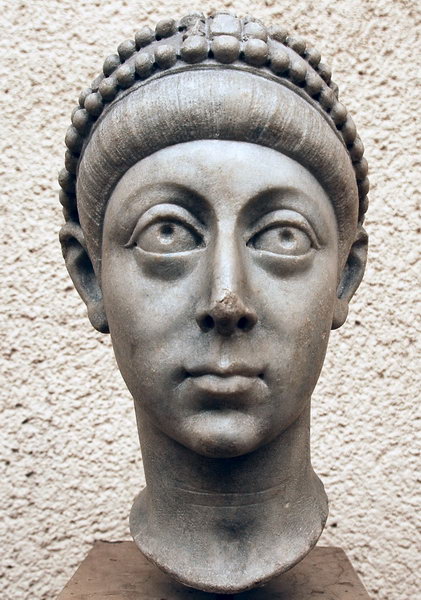Synesius, On Imperial Rule 22
 In his speech On Imperial Rule (or On Monarchy), Synesius of Cyrene offers some advise to the emperor Arcadius (395-408). More information about this speech, together with a brief summary, can be found here.
In his speech On Imperial Rule (or On Monarchy), Synesius of Cyrene offers some advise to the emperor Arcadius (395-408). More information about this speech, together with a brief summary, can be found here.
Throughout this speech, the word "Scythians" refers to the Tervingian Germans (who would later be known as Visigoths), whereas "king" refers to emperor.
The text is offered here in the translation by A. Fitzgerald. The four-digit numbers are page numbers of the Migne edition.
On Imperial Rule 22
[1] [1105] Now that I have come to this part of my discourse, I have some desire to offer up a prayer also in behalf of my own darling.note May you, my liege, be enamored of Philosophy and real education. For it follows of necessity from what has been said, that you have many rivals in love for whom there is also a certain use; [1108] since now the danger is that her flame may be extinguished through neglect, and that in a little time not even a spark will be left for those who desire to kindle it.
[2] Is it then on account of Philosophy that I have made this prayer, or is it true that she will in no wise suffer, even if she dwells apart from men? For she has her home with God, with whom, even when she is here below, lies her chief concern. And what time this earthly dwelling-place doth not admit her when she comes down to us, she dwells beside the Father and is entitled to say to us
I need not all such honor as this,
I pride myself as honored by the decree of Zeus.note
[3] Now the affairs of men become worse or better or altogether happy, just as she is present or absent. For these things, therefore, as well as for Philosophy, I have prayed; and may I have the fortune to get an answer to the prayer which Plato offered up, but without success.note Would that I might see you take to yourself Philosophy in addition to kingship. No longer shall any man henceforth hear me saying anything concerning kingship. It is indeed time that I were silent, since in this one word I have summed up all.
[4] And, if this is the case, I have given you what I proposed in the first instance, when I myself promised to show you the statue of a king in language. And since the word is in reality the shadow of the deed,note I sought, reversing the process, to make it living and moving through you. Now this I shall see at no distant future, and you will render unto me the reality of the king, if my words shall not merely wait at the portals of your ears for admission, but shall rush in and take their abode in the inmost parts of your soul. In truth I am persuaded that Philosophy has not been aroused to the exhortation without divine assistance; for God, as can be readily conjectured, is eagerly zealous to advance your fortunes. And I should justly be the first to rejoice over the sapling sprung from my seed, making trial of such a king as I am now molding in you, whensoever I give and receive speech concerning the requests of the cities.